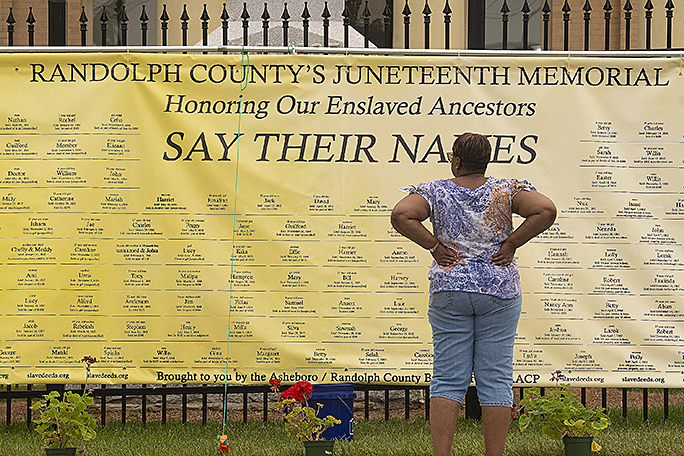Welcome!

Lauren Glasgow of Asheboro studies the Juneteenth Memorial Banner in front of the old Randolph County Courthouse on June 19. Eric Abernathy/Randolph Hub
Local student shares what he learned during Randolph’s Juneteenth events
Wesley Britt
For the Randolph Hub
ASHEBORO — Summer showers didn’t stop The Hope of Eastside from celebrating Juneteenth, a holiday dedicated to the emancipation of all enslaved people in the US. Originally located at Eastside Park, the event moved half-a-mile to Greater St. John Baptist Church. While rain poured outside, people gathered inside the church.
I had the privilege of interviewing Dimitria McSwain and Clyde ‘Chip’ Foust — the vice president and president of the Asheboro, Randolph County chapter of the NAACP, respectively.
Both McSwain and Foust have been pioneers for Black movements in Randolph County.
During both conversations, I learned incredible details about the history of Randolph County.
Foust told me, “There is an assumption in Randolph County that we have been told for years. That one, there were no slaves here … well, we know that’s not true … . In 1860, 10 percent of Randolph County’s population was enslaved. That’s over 1,600 slaves in 1860 alone, and we have documentation that goes back to 1756. We also have documentation that goes past January first, 1863, which means we can document that they were still selling slaves in Randolph County after the Emancipation Proclamation.
“It’s a part of our history that we should recognize and honor. These people built our economy. Ten percent of the population was enslaved, and that labor was a large part of the economy of that time … . We feel like it’s time, as a community, that we honor these people that paved the way for us.”
Unbeknownst to me, I was interviewing Foust and McSwain in a huge part of Randolph County’s Civil Rights Movement. Sitting in a warm room, while cold rain pattered on fogged windows, Foust dropped a surprising detail about the building.
“In the 1960s, the Greater St. John Baptist Church was where people trained for nonviolent protests. So, before they would go to the restaurants and have sit-ins, they came here and trained and prayed. It was very important to us that we include this church into this acknowledgement.”
Community members held bouquets during their march from the church to downtown. Each flower represented a name on the banner showcased downtown. (Visit https://www.slavedeeds.org to learn more about the forgotten members of Randolph County.)
“As we’re moving, we’re going to be calling out the names of the slaves. We want to acknowledge them in a way that they’ve never been before. We are hoping we can do this on a continual basis.”
McSwain has always been a huge proponent for human rights, having led the George Floyd March in 2020. She taught me more about Juneteenth and the march.
“We did the march for George Floyd in 2020, and it started a spark that got things moving a little faster and got more people involved in moving this statue. Chip and a few others came up with the idea to host a march again for this year to march for our own county.
“We are doing this march to get more people involved, and to open more eyes to get people woke to the fact that there were 1,200 slaves from Randolph County and that banner shows it … . We want our ancestors to have respect. We are not trying to make anyone feel bad about their history, but we just want the same respect.
“This march will open a lot of eyes about the slaves. I’m hoping that when we do this march that people from the community and city council will see not only the names, but the ages of these children that were sold, that it will open eyes and make people recognize this aspect of history for Randolph County.”
For the past three years, McSwain has been trying to make Juneteenth a celebration.
“We’ve hosted three Juneteenth events, and I think it is very vital that people know the history of and celebrate Juneteenth, and to know why it is a holiday. I try to make it a big event and educate my nieces and nephews about Black history because there are a lot of things that are not told in history books. People should know about the inventors who made some of their favorite tools and gadgets — inventors that history books do not include.”
It is a hope of McSwains that the people of Randolph County will come together, sharing their cultures and stories with one another.
“We live in a very diverse community, and we need to open learning to all cultures and ethnicities. We should be able to celebrate each other.”
Wesley Britt of Asheboro is an English major at UNCG.
